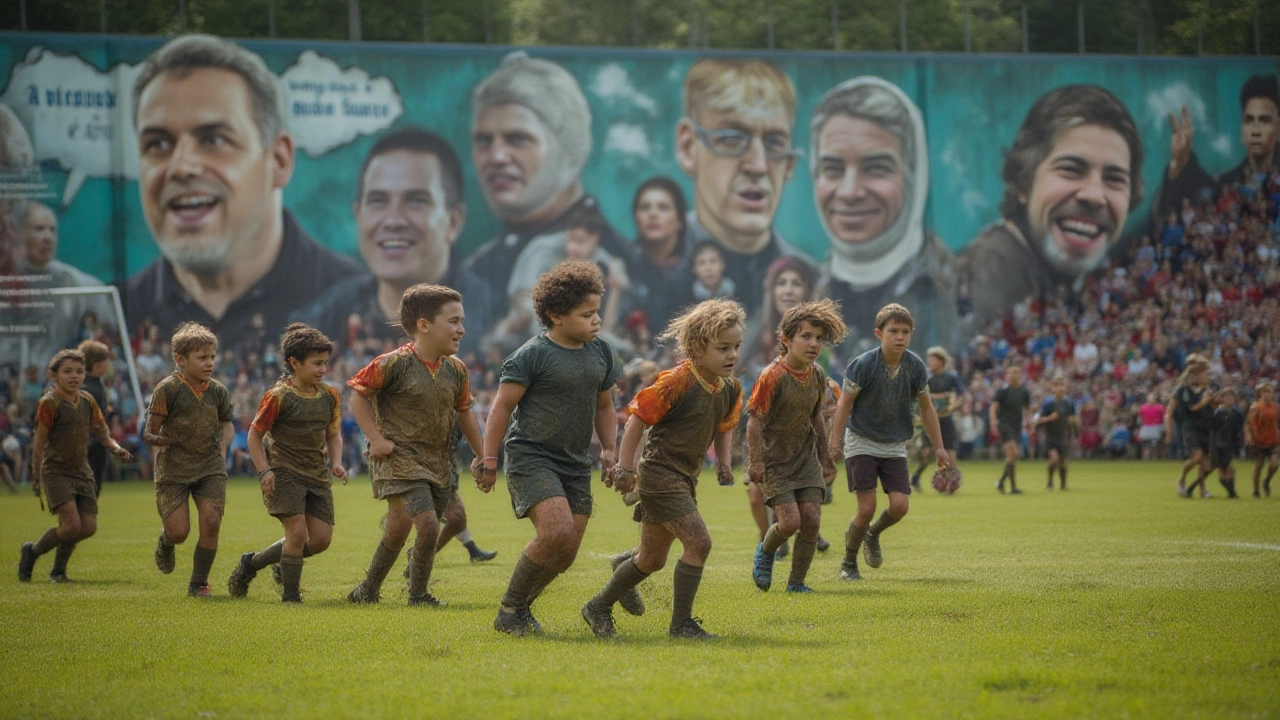Why Rugby Hasn't Taken Off in Germany: The Surprising Truth Explained

Picture a group of teenagers kicking a ball on a Berlin street. Chances are, it’s football. But if you spot a rugby ball? It’s almost like seeing a unicorn. Rugby and Germany—two words that don’t seem to go together. Why is that? Especially when Germany has every ingredient for a thriving sports culture: big cities, massive stadiums, and a love of physical competition. Yet, if you ask the average German to name a rugby player, you’ll probably get a puzzled look. So, what’s keeping rugby from kicking off here?
How Germany's Sporting DNA Was Formed
Walk through any German park on a sunny weekend, you’ll spot people playing football, cycling, maybe even handball or field hockey, but rarely rugby. Germany’s sporting DNA was set in stone decades ago, and football became the undisputed king. Back in the 19th century, Germany was shaping its national identity. Gymnastics—especially under the Turner movement—dominated. The rules were simple, and pretty much everyone had access. Football snuck in from England, and thanks to its simple gear and fast pace, it took off across classes and regions.
Meanwhile, rugby did try to make an entrance. The first rugby match in Germany, played in Heidelberg in 1858, actually predates most European countries outside the UK. The sport hung around, mostly in academic circles and certain wealthy regions. But rugby quickly got swamped by the football wave, especially after the First and Second World Wars when national morale and sporting infrastructure got rebuilt around football—and to a lesser extent, handball and hockey. Club sports became social centers for entire towns, but rugby’s clubs were small and scattered, unable to anchor themselves in working-class life the same way football did.
Fast-forward to the 21st century, and Germany’s football culture has only grown stronger. Kids wear FC Bayern jerseys, not rugby shirts. The national team fills stadiums and sparks public viewing parties, while Germany’s rugby crowd might be happy to fill a few thousand seats in the final of the premier league. There’s a kind of inertia at play—you grow up watching and playing what your parents did, and most schools simply don’t offer rugby at all. The snowball effect is real: more players mean more coaches, better infrastructure, and bigger crowds…except rugby never got its snowball rolling here.
Even compared to other less common sports in Germany, like basketball or American football, rugby’s path has always been tougher. Basketball managed to tap into youth culture, especially in the ’90s with German NBA players like Dirk Nowitzki making headlines. American football grabbed interest thanks to splashy marketing and the rise of broadcast NFL games on German TV. Rugby, meanwhile, never really grabbed the media’s attention, so it remained just under the radar, a niche hobby mostly for expats, students, and pockets in southern Germany.
The Culture Clash: Rugby Versus German Traditions
Now, let’s talk about culture—because sports don’t thrive on fields alone. Rugby’s roots are in England, with its quirky rules and a culture that values roughness on the pitch but a pint and handshake off it. That “gentleman’s sport played by hooligans” vibe is charming in the UK and New Zealand, but it never quite lined up with German expectations. In Germany, contact sports often emphasize discipline and structure. Rugby does fit with those values, but the sport’s culture can feel tribe-like and a bit insular from the outside looking in. Plus, German parents often see rugby as too rough and risky. Hard tackles? Blood? Concussions? Those aren’t easy sells when you’re comparing activities for your kids.
Add to that the language hurdle. Rugby has its own jargon—scrums, line-outs, rucks, mauls. In schools, coaches would need to teach an entirely new vocabulary. Compare that to football, with its universal appeal and straightforward rules. Let’s face it, organizing a spontaneous rugby session is a much bigger ask anywhere in Germany (except maybe Heidelberg) compared to grabbing a ball for a quick football match.
Then there’s the media. When Germans turn on the TV for ‘big sports moments,’ it’s all about the Bundesliga, the DFB-Pokal, or national handball competitions. Rugby matches—whether domestic or Six Nations or World Cups—usually end up buried on obscure pay-TV channels or, at best, get a handful of highlights on YouTube. This lack of visibility locks rugby in a cycle where few kids get inspired by seeing their heroes on screen. Remember when the German national football team won in 2014? Streets were filled, everyone knew the players’ names. When Germany beat Portugal in rugby for a rare win, it barely got a blip in the news.
Now, let’s look at club sports. In many countries, rugby is a club-first sport, with powerful local teams and a pathway from youth to elite. In Germany, football clubs are social hubs, with dozens of teams for men, women, kids—all ages, all abilities. Rugby clubs exist, and some are passionate and strong, but they’re few and far between. That means most Germans never live near a club and don’t have friends who play, so the sport stays out of reach. Even young people who might be curious are more likely to go for something more popular, like basketball or volleyball, where they see social and professional opportunities.

Modern Efforts and Untapped Potential
You might think rugby has given up—but that’s not true. If you dig a little deeper, you’ll see a group of people fighting to push the sport forward in Germany. The German Rugby Federation, founded back in 1900, has bounced between periods of excitement and near-oblivion. Right now, it’s in a rebuilding phase. There are around 130 rugby clubs across the country, concentrated in pockets like Heidelberg, Hanover, and Frankfurt. Some schools are even experimenting with ‘Tag Rugby’ to introduce the basics without the bruises. International events like the Rugby World Cup have drawn some attention, especially when games feature close scores and big upsets.
One real boost came from the expansion of rugby sevens as an Olympic sport. Suddenly, Germany had a shot at competing on a world stage without having to match the physical depth of the top nations in the fifteen-a-side version. The national sevens team has made a few headlines with strong tournament performances—reaching the World Rugby Sevens Series as a “core” team for several years now. That’s not enough to move the cultural needle overnight, but it hints at a possible future where kids might choose rugby, at least in some areas.
Money and infrastructure are still huge roadblocks. To see why, check out the stats in the table below, which compare German rugby club numbers, player participation, and average match attendance with other European countries.
| Country | Number of Rugby Clubs | Registered Players | Average Domestic Match Attendance |
|---|---|---|---|
| Germany | 130 | 15,000 | 800 |
| France | 2,200 | 300,000+ | 10,000 |
| England | 1,900 | 350,000+ | 15,000 |
| Italy | 600 | 70,000 | 2,800 |
| Spain | 250 | 35,000 | 1,900 |
See the huge gap? It’s not just a participation issue—it’s about the support structures around the sport. Facilities are rare, coaching education is spotty, and travel for games takes serious commitment. For most parents and kids, the path of least resistance still leads to football, basketball, or other more mainstream options. But for those who get bit by the rugby bug, the passion is intense. Some German clubs have developed thriving youth sections, send players abroad for training, and regularly host international tournaments. It’s scrappy, but there’s potential—and with continued efforts, especially from schools and grassroots groups, rugby could carve out a bigger niche.
By the way, if you’re an expat, you’ll find rugby clubs near major cities. They’re incredibly welcoming, with mixed teams, fun socials, and language flexibility. Want to join a practice? Just show up with boots. And if you’re curious about safe ways for kids to start, look for non-contact variants like touch rugby or tag rugby, which are popping up more often in international schools.
Could Rugby Ever Boom in Germany?
Maybe you’re wondering if rugby could ever explode in Germany, or at least become more than a side note in the sports culture. The answer isn’t clear-cut, but the chances are better now than they were ten years ago. Germany is changing—kids are open to new experiences, and international sports are everywhere. The rise of streaming and social media means it’s easier to watch the Six Nations or the World Cup, understand the game, and follow teams beyond your borders. If German-speaking commentators and influencers start making noise, rugby might find its way onto playgrounds that are currently ruled by football and basketball.
There’s also a movement among some physical education teachers to bring more variety into school curriculums. That’s where rugby could shine. The sport teaches teamwork, respect, discipline, and physical resilience. Plus, Germany’s obsession with organization and safety means that, over time, rugby might even become a poster child for well-managed contact sport—especially if clubs and schools can show parents how coaches focus on safe tackling, proper equipment, and injury prevention.
Want a tip if you want to get rugby going in a German setting? Work from the bottom up. Join a local club, or if there isn’t one, consider starting a touch rugby group. Offer to introduce the basics at your child’s school, or organize a World Cup viewing party. The more visible the sport, the more normal it feels, and the more likely it is to attract curious players. If you’re looking for role models, follow Germany’s top sevens players—like Jakob Dipper or Anjo Buckman—who’ve proven you don’t have to be from a rugby-mad country to succeed on the world stage.
There’s no single reason rugby hasn’t taken off in Germany—but there’s nothing stopping it from growing, either. The country’s sports community is huge and open to fresh challenges. If rugby gets a few slices of good luck—a home World Cup, a viral German rugby moment, or just a new wave of teachers who love the game—maybe someday you’ll see that rugby ball rolling down Berlin’s streets and nobody will bat an eye.
